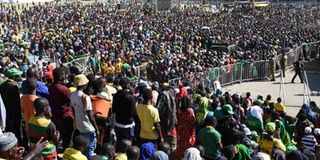Premium
Regional team to virtually monitor Tanzanian polls

Supporters of Tanzania's ruling party Chama Cha Mapinduzi (CCM) attend the official launch of the party's campaign for the October general election at the Jamhuri stadium in Dodoma, Tanzania, on August 29, 2020.
What you need to know:
- The team monitoring the poll includes prominent judges from Kenya and Uganda.
Dar es Salaam. It has emerged that the Kenya Human Rights Commission in collaboration with civil society organisations (CSOs) from Tanzania, East and Southern Africa region, will monitor Tanzania’s October General Election mostly virtually.
The team monitoring the poll includes prominent judges from Kenya and Uganda who have formed the Tanzanian Election Watch panel. It is an alternative independent oversight body comprising leading pan-Africanists, human rights defenders and media professionals.
According to a report by the Kenyan media, the team members named include Kenya’s former Chief Justice Willy Mutunga and Uganda’s Constitutional Review Commission chairman Prof Fredrick Ssempebwa.
Others are Uganda’s High Court Judge Lady Justice Lydia Mugambe, David Makali, Dr Miria Matembe, Prof Chaloka Beyani, Alice Wairimu Nderitu, Dan Wandera Ogalo, Prof Frederick Jjuuko, Betty Murungi, Alice Mugwe and Zein Abubakar.
However, the Tanzania National Electoral Commission (NEC) director of elections Wilson Charles said that although several international observers have been invited to oversee the poll, his office wasn’t sure whether the new panel was among the accredited institutions.
“I’m attending a meeting; therefore it is difficult to remember if they are among those approved. I will be in a position to comment after I have read details on the panel,” he told The Citizen over the phone.
By press time, the director hadn’t confirmed the details of the panel to The Citizen.
Prof Ssempebwa said the team has no interest in taking sides in the polls. He called for respect for human rights, freedom of speech, movement and assembly.
Prof Ssempebwa, who chairs the panel, said economic integration makes the Tanzanian poll an issue of major interest.
The panel will monitor election organisation and preparations through field poll monitors without necessarily travelling to the country due to what it referred to as “political difficulties”.





